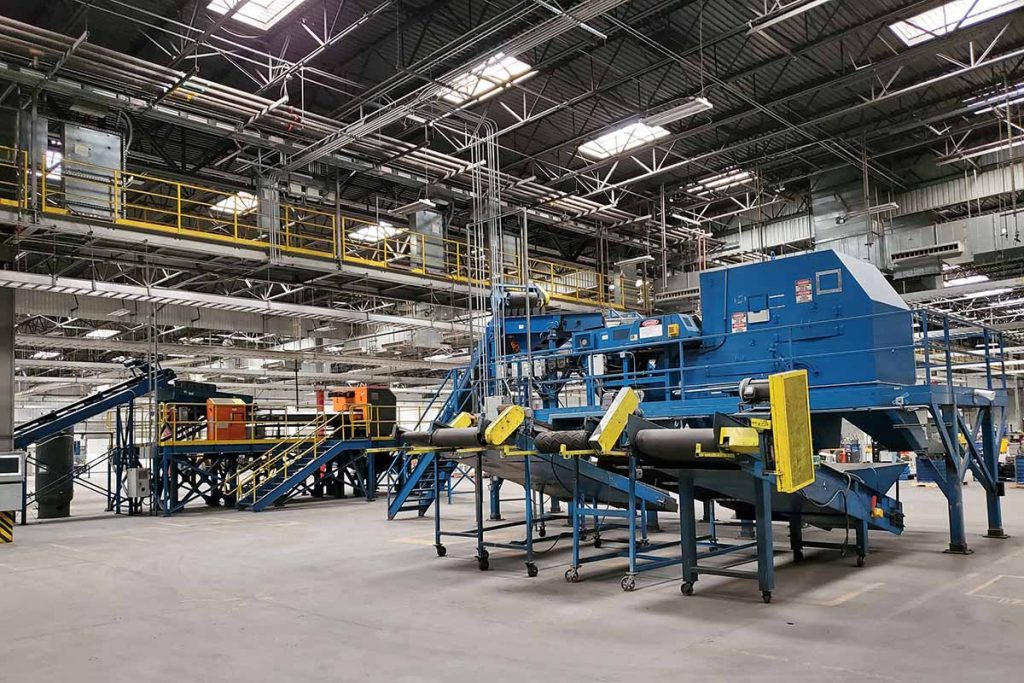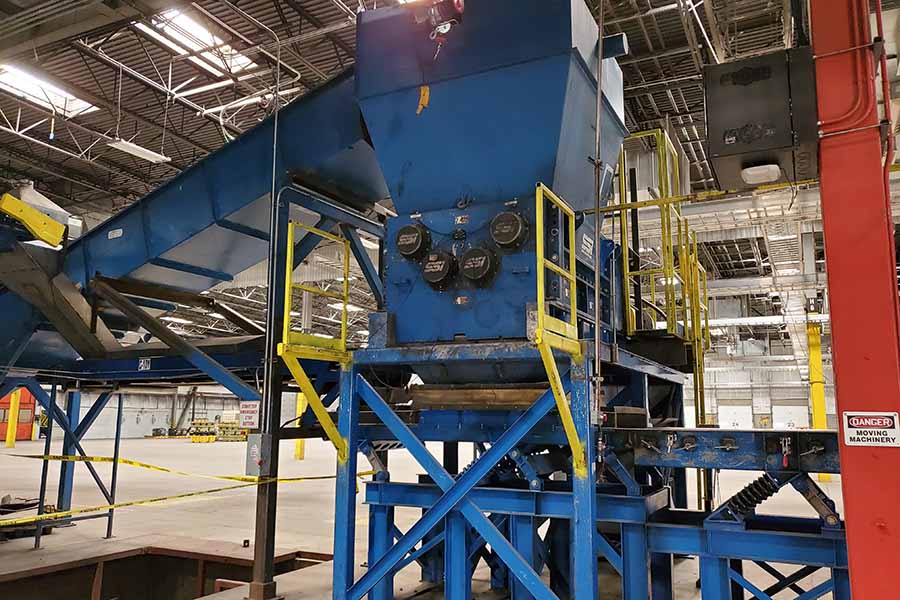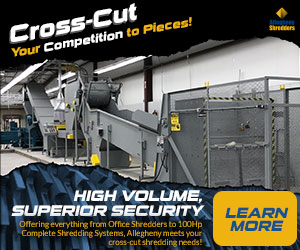
Among the assets being sold from the former ECS site in Stockton, Calif. are an e-scrap shredding and separation line, a CRT recycling line, balers and more. | Courtesy of Tiger Group.
Equipment at ECS Refining’s former flagship facility has been put up for sale, after the owners reached a deal with creditors and then paid to have the equipment decontaminated.
Sales and auction company Tiger Group is listing for sale processing equipment in the former ECS site in Stockton, Calif. An online auction has also been scheduled for June 9.
Up for grabs are an e-scrap shredding and separation line, a CRT recycling line, balers, a wood processing line, material handling equipment, office furniture and more.
Once a major e-scrap company with a nationwide presence, ECS filed for bankruptcy in April 2018 and was forced to close its doors permanently in late June 2018. The company’s founders – and the sole owners at the time of the bankruptcy filing – were brothers Ken and Jim Taggart.
A number of factors contributed to the downfall of the nearly 40-year-old company. Among them were its ongoing battles with SummitBridge National Investments V LLC, which had purchased ECS debt and was owed about $26 million.
ECS had its largest e-scrap processing locations in Stockton and Mesquite, Texas. Equipment in Mesquite was sold to a buyer in January 2019, court records show.
“After our group’s successful turnkey sale last year of the ECS facility in Mesquite, Texas, this will be the final ECS Refining offering,” John Coelho, senior director at Tiger Group, stated in a press release. “The Stockton plant was ECS’ most significant operation.”
The 262,000-square-foot Stockton building has also been listed for sale.
According to a sale page, the equipment includes an e-scrap processing line with SSI shredders, magnets, an eddy current separator and Titech sorters. There is also a CRT processing line with sort stations, conveyors, a dust-collection system, screens, a hammermill, magnet, metal detector and more. The sale also includes Max-Pak and Mosley balers.
The sale or auction will be conducted on behalf of Sinclair Partners, which owns the facility and equipment. The Taggarts own Sinclair Partners.
Jamie Dreher, attorney for Sinclair Partners and the Taggarts, said Sinclair Partners paid an environmental services company to clean the equipment, as required by the California Department of Toxic Substances Control (DTSC).
An attorney for DTSC previously told the bankruptcy court judge the state was concerned about metal dust on equipment at the facility, given that it shredded and dismantled scrap devices containing hazardous materials.
DTSC spokesman Russ Edmondson confirmed to E-Scrap News the equipment was decontaminated according to specifications of the DTSC-approved closure plan. San Jose, Calif.-based decontamination and disposal company ACT Environmental submitted laboratory results demonstrating the equipment was cleaned, he noted.

This SSI shredder is among the assets being sold from the former ECS facility. | Courtesy of Tiger Group.
Fate of the Mesquite equipment
Bankruptcy trustees overseeing the ECS estate on behalf of creditors got court approval to abandon ownership of the equipment at both the Stockton and Mesquite locations. They did that after they decided the equipment, which required cleaning before it could be sold, was of no value to the estate.
After that, wrangling over the equipment fell to SummitBridge, which held a security interest in the equipment, and the Taggarts, who own the equipment, buildings and land.
In Mesquite, SummitBridge got a state court to appoint a receiver, who arranged the sale of equipment on behalf of SummitBridge. An auction had been scheduled in January 2019, but before the auction could be held, Pete Davis of Atlanta private investment firm Peachtree Investment Solutions paid $660,000 to buy all of the Mesquite equipment, according to court records.
Peachtree Investment Solutions launched Recleim, an appliance recycling company with plants in Pennsylvania, Ohio and South Carolina (Recleim’s headquarters address remains the same as Peachtree’s address).
The details of the arrangement between SummitBridge and the Taggarts over the Stockton equipment, such as if and how the proceeds of the sale would be divided, aren’t publicly available. Dreher said “Sinclair Partners and SummitBridge resolved issues related to the equipment.”
Because the assets are no longer the property of ECS’s estate, there’s no obligation by the parties to inform the bankruptcy court and trustee about their disposition.
More stories about processors
- Makor ERP to incorporate ESG reporting into platform
- Australian metals company rebrands, builds Texas plant
- E-scrap buyer launches AI to recognize circuit board grades



